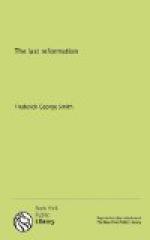[Sidenote: Inherent evils]
I cheerfully admit that God has worked among his people in all ages in accordance with the degree of light and truth which they possessed. But I can not forget that the greatest revivals of evangelical religion have either taken place in spite of the sect system or among those who had just made their escape from the bondage of ecclesiastical despotism and had not as yet become very deeply affected by the sectarian principle. To what source, then, are we to trace sects? What is their cause?
[Sidenote: Alleged causes of sect-making]
A large proportion of the Christian world would reply without hesitation that the existence of the modern sects is due to these two things: the principle of religious liberty and the limitations of human knowledge. Such an answer reveals a superficial view of the whole subject. Religious liberty among Christians existed in the primitive church before the rise of ecclesiastical tyranny over the conscience, and the masses of men in those days were at least as limited in knowledge as are we. Still, the church was one; it was not divided into rival and hostile sects. There was no need in those days of constructing churches to conform to the limited capacity of men’s minds; for there was already in existence a church sufficiently catholic in its nature and spirit to accommodate all classes of minds, because there was in operation the power of the Spirit of God which revealed truth to men and thus enlightened their minds and brought them into harmony with the divine standard. Concerning the principle of religious liberty, I shall have more to say hereafter.
[Sidenote: Human limitations]
The natural limitations of human knowledge may account for difference of opinion, but more than this is required to account for the entire system of organized sects such as we see it today. Millions of evangelical Christians possessing spiritual affinity and holding opinions no more divergent than often exist between members of the same sect, are, nevertheless, divided into independent, rival parties. Something else originated and now perpetuates that barrier between them.
When differences are fundamental and therefore unavoidable, they will become more pronounced under test than at any other time. If, during an epidemic, a physician believes that the method of treatment employed by another doctor is actually killing the patients, his opposition to such a method will then he stronger than at any other time. As long as that method is simply a theory, it is harmless. Only when put into practise does it become dangerous.




